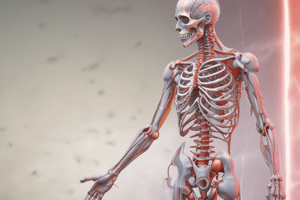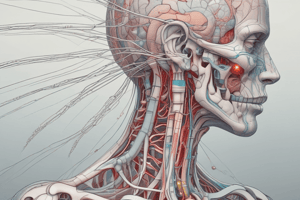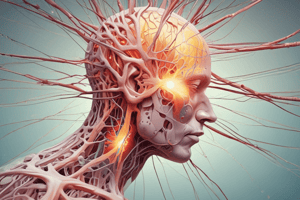Podcast
Questions and Answers
What is a major contributing factor to Multiple Sclerosis (MS)?
What is a major contributing factor to Multiple Sclerosis (MS)?
- Height
- Age (correct)
- Eye color
- Diet
Multiple Sclerosis is characterized by the permanent loss of nerve function from the onset of the disease.
Multiple Sclerosis is characterized by the permanent loss of nerve function from the onset of the disease.
False (B)
What happens to myelin sheaths in Multiple Sclerosis during initial attacks?
What happens to myelin sheaths in Multiple Sclerosis during initial attacks?
They become damaged.
In Multiple Sclerosis, the inflammation of the nerves is mediated by the ______.
In Multiple Sclerosis, the inflammation of the nerves is mediated by the ______.
Match the following aspects of Multiple Sclerosis with their description:
Match the following aspects of Multiple Sclerosis with their description:
Which of the following medications is classified as an anticholinergic?
Which of the following medications is classified as an anticholinergic?
Psyllium is used as a laxative to treat diarrhea.
Psyllium is used as a laxative to treat diarrhea.
Name one example of a phosphodiesterase inhibitor.
Name one example of a phosphodiesterase inhibitor.
The antidepressant __________ is also known as a tricyclic antidepressant.
The antidepressant __________ is also known as a tricyclic antidepressant.
Which group of drugs is commonly used to alleviate symptoms of chronic pain syndrome?
Which group of drugs is commonly used to alleviate symptoms of chronic pain syndrome?
Match the following drug classes with their examples:
Match the following drug classes with their examples:
Amantadine is classified as a CNS stimulant.
Amantadine is classified as a CNS stimulant.
To prevent side effects when taking __________, drink at least 8 ounces of liquid.
To prevent side effects when taking __________, drink at least 8 ounces of liquid.
Which of the following is a common cognitive manifestation of a disease?
Which of the following is a common cognitive manifestation of a disease?
Lhermitte’s sign involves a persistent numbness in the limbs.
Lhermitte’s sign involves a persistent numbness in the limbs.
What is one of the major diagnostic criteria for MS?
What is one of the major diagnostic criteria for MS?
The symptom characterized by urinary urgency and frequency is known as _________ bladder.
The symptom characterized by urinary urgency and frequency is known as _________ bladder.
Match the following symptoms with their descriptions:
Match the following symptoms with their descriptions:
Which of the following cognitive difficulties may significantly impair daily living in MS patients?
Which of the following cognitive difficulties may significantly impair daily living in MS patients?
What is the possible emotional manifestation common in MS patients?
What is the possible emotional manifestation common in MS patients?
MRI scans can definitively diagnose multiple sclerosis.
MRI scans can definitively diagnose multiple sclerosis.
What is another name for Amyotrophic Lateral Sclerosis?
What is another name for Amyotrophic Lateral Sclerosis?
ALS typically affects only the upper motor neurons in the body.
ALS typically affects only the upper motor neurons in the body.
What typically leads to death in ALS patients?
What typically leads to death in ALS patients?
The onset of ALS typically occurs between the ages of _____ and _____ years.
The onset of ALS typically occurs between the ages of _____ and _____ years.
Which of the following is a typical symptom of ALS?
Which of the following is a typical symptom of ALS?
Match the following symptoms with their descriptions:
Match the following symptoms with their descriptions:
Men are more likely to develop ALS compared to women.
Men are more likely to develop ALS compared to women.
What physical changes occur in the muscles due to the loss of lower motor neurons in ALS?
What physical changes occur in the muscles due to the loss of lower motor neurons in ALS?
Which of the following is NOT a guideline for addressing family needs of clients with degenerative neurologic disorders?
Which of the following is NOT a guideline for addressing family needs of clients with degenerative neurologic disorders?
Coping positively with stress involves managing emotional responses and dealing with role changes.
Coping positively with stress involves managing emotional responses and dealing with role changes.
List three interventions to identify a client’s new health problems.
List three interventions to identify a client’s new health problems.
The family may experience _______ when making healthcare decisions for their loved one.
The family may experience _______ when making healthcare decisions for their loved one.
Match each coping strategy with its description:
Match each coping strategy with its description:
Flashcards are hidden until you start studying
Study Notes
Multiple Sclerosis (MS)
- Chronic, progressive immune-mediated disease affecting the central nervous system (CNS).
- Characterized by segmental demyelination of nerve fibers, primarily in young adults (ages 20-50) and more common in women.
- Symptoms of neuropathic pain include Lhermitte’s sign, described as an electric shock sensation with neck flexion.
- Cognitive difficulties can occur, affecting short-term memory, attention, and word-finding, usually developing later in disease progression.
Clinical Manifestations
- Bowel and bladder dysfunctions include issues like constipation and spastic/flaccid bladder, leading to urgency or urinary retention.
- Sexual dysfunction involves erectile dysfunction, decreased libido, and painful intercourse.
- Severe fatigue is prevalent in many patients, significantly impairing quality of life.
- Emotional symptoms may include lability, depression, and anxiety.
Diagnostic Studies
- There is no definitive diagnostic test for MS; diagnosis based on MRI findings of sclerotic plaques and other criteria.
- Diagnosis requires evidence of at least two inflammatory demyelinating lesions in different CNS locations, with damage occurring at different times.
- All other potential diagnoses must be ruled out.
Collaborative Care
- Drug Therapy Examples:
- Anticholinergics (e.g., Oxybutynin, Tolterodine) for bladder symptoms.
- Laxatives for constipation (Docusate sodium, Psyllium).
- Antidepressants (Amitriptyline, Sertraline, Fluoxetine) for depression and chronic pain.
- PDE inhibitors (e.g., Sildenafil) increase blood flow, treating erectile dysfunction.
- CNS stimulants (e.g., Amantadine, Methylphenidate, Modafinil) for fatigue.
Amyotrophic Lateral Sclerosis (ALS)
- Known as Lou Gehrig’s disease, it has an unknown etiology affecting both upper and lower motor neurons.
- Characterized by axonal degeneration leading to progressive muscle weakness, spasticity, and paralysis, typically between ages 40-70.
- Symptoms include dysarthria, dysphagia, muscle weakness, fasciculations, cramping, and overactive deep tendon reflexes.
- Patients retain cognitive function despite significant physical deterioration, commonly leading to respiratory failure.
Clinical Management for Families
- Strategies should address new health problems, coping with stress, and making healthcare decisions for loved ones with degenerative neurological disorders.
Studying That Suits You
Use AI to generate personalized quizzes and flashcards to suit your learning preferences.




